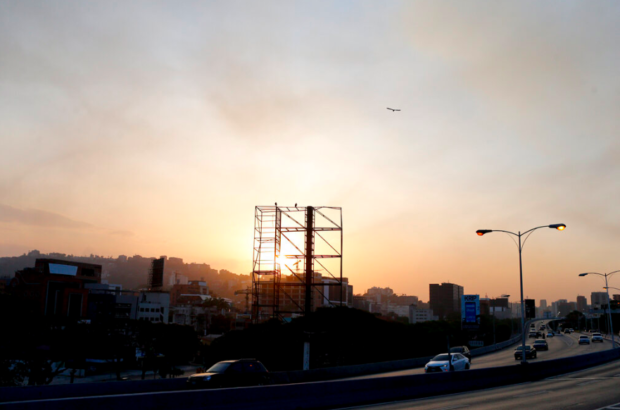
A billboard stands empty above a highway with no traffic as the sun sets in Caracas, Venezuela on March 18, 2019. AP
CARACAS, Venezuela — When the sun goes down in Venezuela’s capital of Caracas, the once-thriving metropolis empties under darkness.
Many street lights don’t work. Residents avoid stepping outside their homes due to crime — or for lack of anything to spend — as a creeping economic collapse has accelerated amid a political battle between socialist President Nicolas Maduro and his foes at home and abroad. A string of devastating nationwide blackouts last month dramatized the decay.
Even under the light of day, billboards often have nothing to promote, their skeletal framework bare long after the wind has ripped away old advertising.
As dusk falls, many storefronts are just graffiti-scrawled security doors chained shut. Often just a single business along a city block is able to stay open, awaiting sparse customers. Others close earlier, like a beauty salon, its few remaining clients forced to decide between the simple luxury of haircut or buying food.
Caracas’ La Mercedes neighborhood, famous for its upscale shopping and nightlife, hasn’t been spared. Many of its pubs and fancy restaurants are devoid of waiters and customers. A shopping mall keeps it lights on, but the doors lock hours earlier than they did before, when they teemed with life.
High-rise buildings stand unfinished, the workers having long ago abandoned their jobs. Windows are covered over with cardboard rather than finished with glass.
Residents desperate for cash transform patches of sidewalk into their impromptu shops, laying out old shoes or second-hand shirts as merchandise.
The poor and hungry scour through household trash, scattering it across street corners before it’s collected, grabbing anything they can use or eat.
President Nicolas Maduro blames his domestic political opponents and the increasing grip of US economic sanctions he says are part of a coup aimed at toppling his socialist government.
The opposition, led by lawmaker Juan Guaidó, blames years of corrupt leadership, lack of investment and economic bungling that has left the country dependent on a collapsing oil sector and on remittances sent home by the millions who have fled the growing hardship. /ee